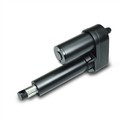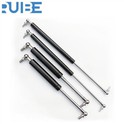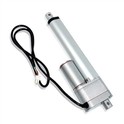Hey there, car enthusiasts! As a supplier of Gas Damper for Car, I've had the privilege of diving deep into the world of automotive technology. Today, I'm super excited to chat about how gas dampers for cars work hand - in - hand with active suspension systems.
Let's start with the basics. If you're not too familiar, a gas damper, also known as a shock absorber, is a key component in your car's suspension. Its main job is to control the movement of the springs and suspension by absorbing and dissipating the energy generated when your car hits bumps, potholes, or even when you make sharp turns. Without a proper damper, your ride would be a wild, bouncy mess, and your car's handling would be seriously compromised.
Now, an active suspension system is a whole new ballgame. Unlike traditional passive suspension systems, which have fixed damping characteristics, active suspension systems can adjust in real - time to changing road conditions, driving styles, and vehicle loads. It's like having a super - smart co - pilot that fine - tunes your car's suspension on the fly.
So, how do gas dampers fit into this high - tech active suspension setup? Well, it all boils down to the unique properties of gas dampers.
Most gas dampers use a combination of oil and gas, usually nitrogen. The gas is compressed inside the damper, and this compressed gas provides a number of benefits. First off, it helps to prevent a phenomenon called "foaming" in the oil. When the damper is working hard, like during aggressive driving or on rough roads, the rapid movement of the piston can cause the oil to foam. Foamy oil doesn't provide consistent damping, which can lead to a loss of control. The compressed gas keeps the oil under pressure, reducing the chances of foaming and ensuring smooth, reliable operation.
In an active suspension system, the gas damper acts as the muscle. The system's control unit, which is like the brain, constantly monitors various sensors around the car. These sensors can detect things like wheel movement, vehicle speed, steering angle, and even the amount of body roll. Based on this information, the control unit sends signals to the gas dampers to adjust their damping force.
For example, if you're taking a sharp turn at high speed, the sensors will detect the increased body roll. The control unit then tells the gas dampers on the outer side of the turn to stiffen up. This increased damping force helps to keep the car more level, reducing body roll and improving cornering stability. On the other hand, when you're cruising on a smooth highway, the dampers can be set to a softer mode for a more comfortable ride.
One of the ways gas dampers can adjust their damping force in an active suspension system is through the use of electronically - controlled valves. These valves can change the flow rate of the oil inside the damper. When the valve is opened wider, the oil can flow more freely, resulting in a softer damping force. When the valve is closed down, the oil flow is restricted, and the damping force becomes stiffer.
Another advantage of gas dampers in active suspension systems is their quick response time. The compressed gas allows the damper to react almost instantly to changes in the control signals. This is crucial for an active suspension system, which needs to make rapid adjustments to keep the car stable and comfortable.
Let's talk about some real - world applications. High - performance sports cars are a prime example. These cars often have very advanced active suspension systems with gas dampers. The ability to adjust the damping force on the fly allows the car to perform well both on the track and on the street. On the track, the dampers can be set to a very stiff mode for maximum handling and cornering grip. But when the driver takes the car out on normal roads, the dampers can be softened for a more civilized ride.
Luxury cars also benefit greatly from gas dampers in active suspension systems. These vehicles are all about providing a smooth, comfortable ride. The active suspension system can constantly adapt to road conditions, ensuring that the passengers don't feel every little bump and dip. The gas dampers play a vital role in this, as they can quickly adjust to provide the right amount of damping for a plush ride.
Now, I know what you might be thinking. "This all sounds great, but how reliable are these gas dampers in an active suspension system?" Well, modern gas dampers are built to last. They're designed to withstand the rigors of daily driving, as well as the extreme conditions of high - performance use. However, like any component in your car, they do require some maintenance. Regular inspections and, if necessary, replacement of worn - out parts are important to keep the dampers and the active suspension system working at their best.
As a Gas Damper for Car supplier, I've seen firsthand the difference that a good gas damper can make in an active suspension system. We work hard to ensure that our dampers are of the highest quality, using the latest technology and materials. Our dampers are designed to be compatible with a wide range of active suspension systems, so whether you're a car manufacturer looking to integrate our products into your new models or a car enthusiast looking to upgrade your existing suspension, we've got you covered.
If you're also in the market for gas dampers for other applications, we also offer Cabinet Gas Damper. These are great for furniture and cabinets, providing smooth, quiet operation when opening and closing.


In conclusion, gas dampers are an essential part of modern active suspension systems. Their unique properties, combined with the ability to adjust damping force in real - time, make them a perfect fit for these high - tech setups. Whether you're looking for better performance on the track or a more comfortable ride on the road, gas dampers in an active suspension system can deliver.
If you're interested in learning more about our gas dampers or have any questions about how they can work with your active suspension system, don't hesitate to reach out. We're always happy to have a chat and help you find the right solution for your needs. Whether you're a car builder, a mechanic, or just a car lover, we can provide the expertise and products you need. So, let's start a conversation and see how we can take your car's suspension to the next level!
References
- Automotive Suspension Technology by William F. Milliken and Douglas L. Milliken
- Modern Vehicle Technology by James D. Halderman






